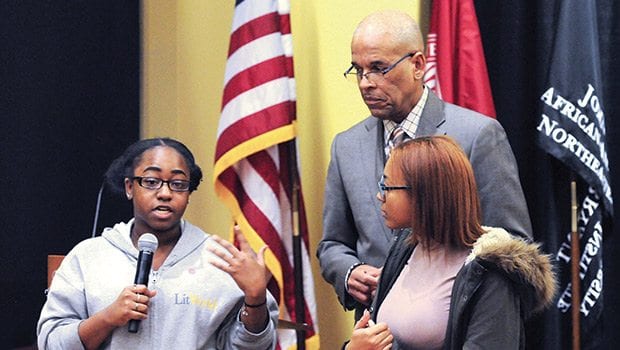Bostonians discuss divisive political climate
Students, officials react to heightened racial tensions

As Bostonians continue to grapple with the shockwaves emanating from businessman Donald Trump’s upset victory in the 2016 presidential election, a group of Bostonians gathered at Northeastern University’s John D. O’Bryant African American Institute to take stock of where the nation is heading.
“Like all of you, I woke up to a new world,” said moderator Jose Masso, who campaigned for Democratic presidential candidate and former Secretary of State Hillary Clinton in New Hampshire on Election Day.

Author: Photo: Randy H. Goodman/DonWestFotoModerator Jose Masso (left) poses a question to panelists at “Where Do We Go From Here — A Post-Election Leadership Roundtable” at the John D. O’Bryant African American Institute at Northeastern University. Panelists were (l-r) State Senator Linda Dorcena Forry, Eastern Bank vice-chairman/CBO Quincy Miller, Boston City Councilor-at-large Ayanna Pressley, Suffolk County Sheriff Steve Tompkins, playwright Akiba Abaka, and Boston NAACP president Michael Curry. The evening focused on ways to address the human disconnect and to build a broader “common good” community to advance key pro-justice and equity solutions in Boston.
“People are frightened,” said one audience member. “Frightened that they’re going to lose their housing. Frightened that they’re going to lose their benefits.”
In Boston and across the country, activists have taken to social media and the streets, chanting “Not my president” to protest Trump’s victory. Last week’s forum, co-hosted by the O’Bryant Institute, Portraits of Purpose Initiative and the Northeastern University Black Student Association, was aimed at facilitating dialogue in what for many is a difficult time.
“The world shifted since we planned this whole thing,” said Libby Shufro, one of the event organizers. “But we know, regardless of who landed the presidency, we the people need to keep our eyes on the prize and advocate for a social justice agenda.”
The event paired veteran civil rights activists like Mel King with up-and-coming activists, officials and students for a wide-ranging dialogue on the current state of social justice.
State Sen. Linda Dorcena Forry said that Trump’s election has created stress in many communities.
“Imagine what our children are feeling,” she said. “They’re saying ‘Wow. We have a bully as president of the United States. We have a president who is attacking immigrants. We have a president who has a lot of disrespect for women.’”
Some at the forum said the tone in Washington is filtering into day-to-day interactions.
At Boston Latin Academy, a male student pushed a female student into a corner, telling her, “I can rape you, now that Donald Trump is president,” Kendra Gerald, a sophomore at the school, told the audience.
Later, as students took stock of the future under a president whose campaign sounded anti-immigrant, anti-Muslim, anti-black and misogynistic themes, emotions poured forth.
“There are undocumented kids in my class,” she said. “Everyone was crying.”
When Masso asked whether blacks should make more of an effort to understand the white rage that many believe led to Trump’s election, NAACP Boston Branch President Michael Curry suggested blacks have more to be angry about than whites.
“The wealth gap is still an issue,” he said. “We’re still being shot and murdered by law enforcement. We still have difficulty getting into unions, a traditional pathway to the middle class. Where is black peoples’ anger? Where is Latino people’s anger? We have more to be angry about.”
Suffolk County Sheriff Steve Tompkins said that higher incarceration rates for blacks charged with drug possession underscore deeper flaws in the criminal justice system and in American society.
“The system is rigged,” he said. “But it’s rigged against us.”
“I have not heard one word about fascism,” said poet Askia Toure. “Secretary Clinton won the election by more than a million votes. Black people are in a very vulnerable position right now because we don’t have structures in place to support mass movements.”
Panelists agreed that Trump’s term over the next four years makes it even more imperative that people of color work together.
Eastern Bank Vice Chairman Quincy Miller argued for greater financial empowerment.
“You have to start with education,” he said. “With the first job I got out of college, I made more than my mother made in 25 years of working at a restaurant.”
Former state Representative Mel King said people of color need better access to jobs and opportunities.
Dorcena Forry said Trump’s opponents should also work to defeat regressive policies through negotiation and legislative action.
“People are hitting the streets, and that’s important, but we need people to be at the table,” she said.







